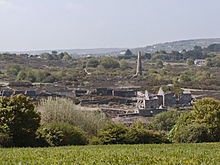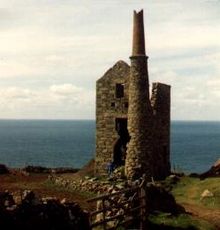- Stannary Courts and Parliaments
-
For the organisation that claims to be the modern Cornish Stannary Parliament, see Revived Cornish Stannary Parliament.
The Stannary Parliaments and Stannary Courts were legislative and legal institutions in Cornwall and in Devon (in the Dartmoor area), England. The Stannary Courts administered equity for the region's tin-miners and tin mining interests, and they were also courts of record for the towns dependent on the mines. Executive authority in stannary areas was exercised by the Lord Warden of the Stannaries.
The separate and powerful government institutions available to the tin miners reflected the enormous importance of the tin industry to the English economy during the Middle Ages. Special laws for tin miners pre-date written legal codes in Britain, and ancient traditions exempted everyone connected with tin mining in Cornwall and Devon from any jurisdiction other than the Stannary Courts in all but the most exceptional circumstances.
King John granted a charter to the tin miners of Cornwall and Devon in 1201, confirming their "just and ancient customs and liberties". The tin miners of both areas originally met together at Hingston Down and referred to themselves as a parliament. Edward I of England split the stannary institutions between Cornwall and Devon, establishing parliaments and courts for the two counties separately. The jurisdiction of the Cornwall stannary institutions covered the whole of the county, while the stannary courts of Devon had a reputation for harsh justice,[1] and once jailed a Westminster MP (Richard Strode).[2]
As the tin mines of Cornwall and Devon lost their economic importance during the 18th and 19th centuries, their political institutions also waned in power and ultimately faded away, until recent efforts to restore them.
Contents
Devon Stannary Parliament
Edward I's 1305 Stannary Charter established Tavistock, Ashburton and Chagford as Devon's stannary towns, with a monopoly on all tin mining in Devon, a right to representation in the Stannary Parliament and a right to the jurisdiction of the Stannary Courts. Plympton became the fourth Devon stannary town in 1307.
The parliament consisted of ninety-six jurates, with twenty-four being chosen by each of the four Devon stannaries. The jurates were chosen at special courts held in each stannary by "tinners": a term broad enough to include not just miners and tin work owners, but others concerned with the tin industry.[3] The Parliament usually met in an open air forum at Crockern Tor. The last convocation of the Devon Parliament was in 1786,[4] but as late as the 1980s, an honorary Stannator would be named whenever a new tin mine was opened.[5]
Cornish Stannary Parliament
The privileges of the stannaries of Cornwall were confirmed by Edward III on the creation of the Duchy of Cornwall in 1337. This confirmed that the tin miners were exempt from all civil jurisdiction other than that of the Stannary Courts, except in cases affecting land, life or limb. There was at this period no definition of the districts of each stannary.[6]
The Cornish Stannaries were suspended in 1496, prior to the Cornish Rebellion of 1497.[7] Henry VII restored them in return for a payment from the tin miners of the sum, enormous at the time, of £1000, to support his war on Scotland. In addition to restoring the Stannaries and pardoning the people who participated in the rebellion, Henry's Charter of Pardon 1508 provided that no new laws affecting miners should be enacted without the consent of twenty-four stannators, six being chosen from each of the four stannaries:
- Foymore (or Foweymore): chosen by the mayor and corporation of Lostwithiel
- Blackmore: by the mayor and corporation of Launceston
- Tywarnhaile (or Tynwarnhail): by the mayor and corporation of Truro
- Penwith and Kerrier: by the mayor and corporation of Helston
The 1508 Charter states, "No [Westminster] Act or Statute shall have effect in the Stannaries without the assent and consent of the twenty-four stannators." Acting in its capacity as appeal court for the colonies, the Judicial Committee of the Privy Council has declared that any reference to The Stannaries means the whole of Cornwall.[citation needed]
Although England had its own London based Exchequer, the unabridged Charter of Pardon makes no fewer than ten separate references to the Lostwithiel exchequer; thus illustrating one aspect of the constitutional linkage between Stannary and Duchy.
However, there is controversy over the standing of the Cornish legal system and attempts by Stannators to assert their ancient rights have all been defeated in the English Courts. The validity of these judgements have yet to be tested in the European legal theatre.
The stannators were described in 1831 as being "some of the principal gentlemen of the mining district". On assembly the stannators elected a speaker, the meeting being termed a Stannary Parliament. The parliaments were convened occasionally by the Lord Warden of the Stannaries when it was felt that laws concerning the miner's rights needed to be made or revised.
The Cornish Stannary Parliament last assembled at Truro in 1752, and continued until 11 September 1753.[8] The English legal system does not recognise desuetude (laws lapsing through lack of use), and the precedent of the Court of Chivalry, which sat in 1952 for the first time in over 200 years, means that the Stannary Parliament, although not in session, still exists. The 1508 Charter of Pardon is still on the statute books as was confirmed in the House of Commons in recent years. (In 1977 the Plaid Cymru MP Dafydd Wigley in Parliament asked the Attorney General for England and Wales if he would provide the date upon which enactments of the Charter of Pardon 1508 were rescinded. The reply, received on 14 May 1977, stated that a Stannator's right to veto Westminster legislation had never been formally withdrawn).[9][10]
In March 2007, Bridget Prentice, Parliamentary Under-Secretary of State in the Ministry of Justice stated in a written answer in the House of Commons "...there are no valid Cornish stannary organisations in existence.", "There are no treaties today that apply to Cornwall only..." and that " There is no special status for legislation which applies to Cornwall or to Cornish localities."[11]
Stannary Courts
The Devon Stannary Courts met in Lydford and operated a prison there, while the Cornish Stannary Courts met primarily in Truro. The Devon and Cornwall Stannary Courts were merged following the Stannaries Act 1855, but their powers were later transferred to county authorities by the Stannaries Court (Abolition) Act 1896.[12]
The relations between the Stannaries and Westminster are illustrated by Strode's Case (1512).
Mining courts and customs in other counties
While the stannaries of Devon and Cornwall had the most developed legal systems, a number of other mining communities had similar privileges. The customs of the community were usually confirmed by charter, with the miners having the right to seek for minerals in all areas other than tilled fields, subject to paying taxes to the Crown.
Examples included:
- Gloucestershire: The Free Miners of coal and iron of the Forest of Dean had their customs confirmed by charter attributed to Edward I, with a miner's court to try cases between the miners, and a miner's parliament.
- Derbyshire: The hundreds of High Peak and Wirksworth (an area known as the "King's Field") were divided into eight "liberties" for the purposes of lead mining.
- Somerset: The customs of the lead-mining district of the Mendip Hills were encoded under Edward IV. Two courts, consisting of twelve miners, were held annually to enforce the code.
- Cumberland: The lead miners of Alston Moor enjoyed legal privileges from the thirteenth century. By the reign of Henry V there was in existence a court of mines, and the miners elected a coroner and bailiff, with the king's officers having no authority to serve writs in the area.[3]
Revived Cornish Stannary Parliament
Main article: Revived Cornish Stannary ParliamentSome Cornish political activists claim to have revived the Stannary Parliament since 1974, along with the right to veto British legislation. Indeed, it purports to have actually vetoed acts passed by the Parliament of the United Kingdom, although has been unable to enforce this.
On 12 December 1974 the Home Office replied to letters from the members of this revived Parliament, saying that the Home Office could accept elections by the stannary towns only as constitutive of a valid Stannary Parliament. However, the Stannaries were not abolished, and the Home Office has made no effort to hold these elections. The Revived Cornish Stannary Parliament is driven primarily by Cornish nationalism and demands for greater local autonomy, along with arguments about the constitutional status of Cornwall.
See also
References
- ^ ((cite web [url=http://www.legendarydartmorr.co.uk/lydford_law.htm))
- ^ ((cite web [url=http://www.Plympton.info/HistSTA/HTM))
- ^ a b G.R. Lewis, The Stannaries, a study of the medieval tin miners of Cornwall and Devon (1908). (11 Mb PDF document)
- ^ Greeves, T 1987 'The Great Courts or Parliaments of the Devon Tinners' Rep Trans Devonshire Ass 119, 143-66
- ^ "Devon's Mining History and Stannary parliament". users.senet.com.au. http://users.senet.com.au/~dewnans/Devon_Stannary_History.html. Retrieved 2008-04-26.
- ^ Hatcher, John (1970) Rural Economy and Society in the Duchy of Cornwall 1300-1500. Cambridge University Press ISBN 0521085500 (includes on p. xiv a map of the districts)
- ^ "Cornwall County Council - Timeline of Cornish History 1066–1700 AD". www.cornwall.gov.uk. http://www.cornwall.gov.uk/index.cfm?articleid=5749. Retrieved 2008-04-26. (See entry for 1497.)
- ^ Lewis, Samuel (1831) Topographical Dictionary of England, volume I
- ^ "Cornwall County Council - Timeline of Cornish History 1800 AD to date". www.cornwall.gov.uk. http://www.cornwall.gov.uk/index.cfm?articleid=5919. Retrieved 2008-04-26. (See entry for 14th May 1977.)
- ^ In 1978 Dafydd Wigley deposited his papers regarding this in the National Library of Wales, Aberystwyth.
- ^ House of Commons Hansard - Written Answers - March 29, 2007:Column 1673W (accessed August 27, 2007)
- ^ 1911 Britannica entry for "Stannaries"
External links
Categories:- Politics of Cornwall
- English law
- History of Cornwall
- Mining in Cornwall
- Mining in Devon
- History of Devon
- Legal history of England
- Culture in Devon
- Dartmoor
- Tin mining
- Cornish culture
Wikimedia Foundation. 2010.


